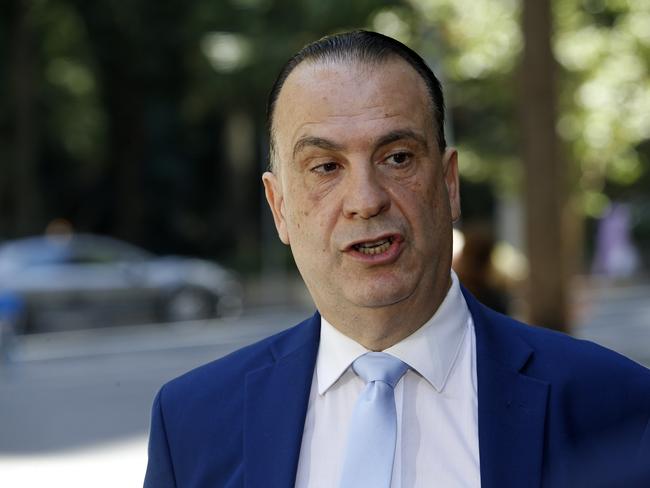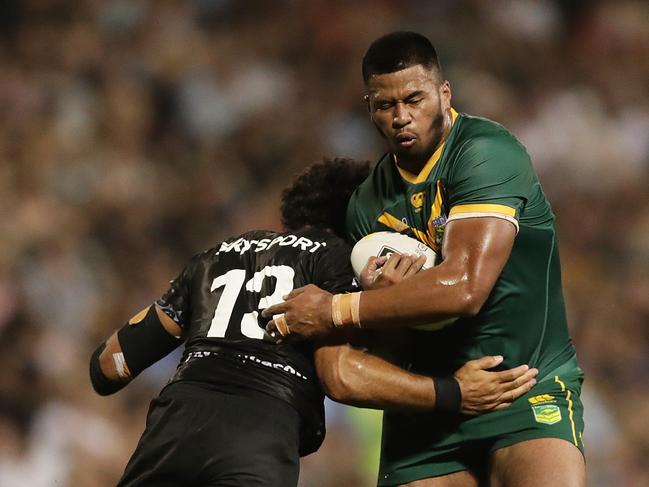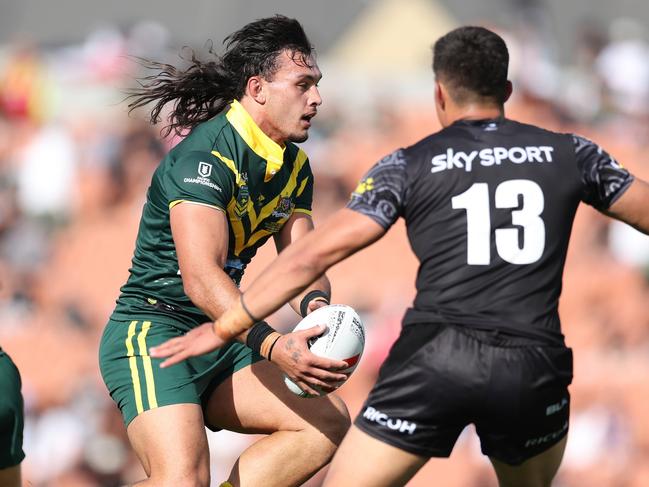NRL reject calls for representative eligibility overhaul
ARL Commission boss Peter V’landys has rejected calls for an overhaul of rugby league’s controversial representative eligibility rules, as a host of stars consider changing allegiances.

NRL
Don't miss out on the headlines from NRL. Followed categories will be added to My News.
ARL Commission boss Peter V’landys has rejected calls for an overhaul of rugby league’s controversial representative eligibility rules in the wake of the Payne Haas-Tino Fa’asuamaleaui poaching saga.
Former Maroons coach Wayne Bennett has warned V’landys the code’s showpiece – State of Origin – risks being killed off if scores of NSW and Queensland players could play for Pacific nations, rejecting Australia in the process.
As revealed by this masthead, Samoa have made formal approaches to NSW enforcer Haas and Queensland prop Fa’asuamaleaui to walk away from Australia and commit to the second-tier minnows.
The revelation has triggered mass debate over the code’s representative rules, with former NSW coach Phil Gould calling for an open-slather policy where any player eligible for Origin should also be allowed to represent another nation.
Under the current rules, Haas and Fa’asaumaleaui could play for Samoa and still be eligible for State of Origin because the Pacific nation is regarded as a tier-two international team.
NRL players who turn out for Australia’s other tier-one rivals – New Zealand and England – are banned from playing State of Origin.
Bennett has floated the idea of Tonga and Samoa being promoted to tier-one status.
That scenario would see a mass of Origin stars such as Jarome Luai, Brian To’o, Jeremiah Nanai and Steve Crichton ruled ineligible for NSW or Queensland if they stayed loyal to their Pacific nations.

V’landys, however, has baulked at Bennett’s proposal, saying there will be no drastic shake-up of eligibility laws as the ARLC boss backed the growth of international football.
“It’s not on the agenda at the moment,” V’landys said when asked if there will be urgent changes to code’s representative eligibility rules.
“It’s on the media’s agenda but it’s not on ours.
“I have no issue.
“It’s important to keep the international game strong and the current system has been great for the success of the Pacific nations, so why would we change the rules?
“I think it’s great.”

Historically, State of Origin was the ultimate selection trial for Australian representation.
And under current Origin laws, drafted by the ARL Commission in 2012, players had to “elect to play for Australia” and “have not represented another tier-one nation at senior level” to be eligible for NSW or Queensland.
The flashpoint occurs when several Origin stars, such as NSW trio Luai, Crichton and To’o, elect not to play for Australia and choose Samoa instead.
The representative tug of war will intensify in the coming months if Haas chooses to give up his Australian jumper after this year’s Origin series and turn out for Samoa, which the Broncos prop is expected to do.
The traditional view is that Origin players should only be permitted to qualify for Australia, but V’landys says times have changed with the explosion of Polynesian talent over the past two decades.
“The State of Origin system works exceptionally well now,” V’landys said.
“There’s as many people saying we shouldn’t touch it as there are people who want to change it.
“This debate doesn’t affect Payne Haas anyway because Samoa is a tier-two country, so he can still play State of Origin.
“If that’s the preference (of Origin players with Polynesian heritage) we respect their decision.
“The rules are in place to stop players moving from tier-one countries, but Australia is strong enough without having to put bans on players wanting to represent their heritage.
“We have looked at these rules on a number of occasions and it’s such a polarising issue that we’ve not decided not to do anything.
“I’m happy with the rules as they stand.”

Gould believes a player such as Roosters forward Victor Radley – who qualifies for NSW but cannot play for the Blues because he has played for England – should be eligible for Origin.
“Why shouldn’t they be allowed to do that?” the former NSW coach said in his Six Tackles With Gus podcast.
“Why wouldn’t the game encourage that?
“I’ve said this many times – we need to sell our game as an international game.
“You know which country you should be playing for when they play the national anthem – it’s the one that moves you and that’s the country you should be playing for.
“Our qualifications domestically need to keep up with that and the world of rugby league can’t be dominated by qualification for Origin. If you qualify for Origin football, you should be allowed to play Origin football – regardless of your heritage or your history.
“As long as you meet the criteria or qualifications to play Origin football, you should be allowed to play for NSW or Queensland.
“On the international stage, you should be able to play for whoever you like … but you can’t be jumping from one country to another.
“Payne Haas and Tino Fa’asuamaleaui can choose to play for Samoa because they’re not tier one countries.
“They have got to get away from this and just make it open slather.”
More Coverage
Originally published as NRL reject calls for representative eligibility overhaul





